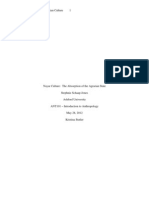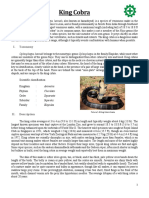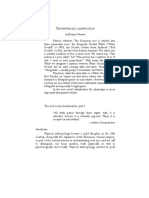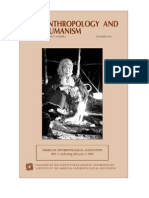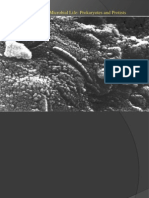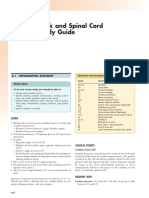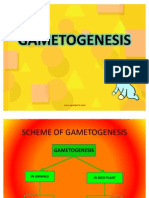0 ratings0% found this document useful (0 votes)
28 viewsHominids: Millania Putri Shayen 1810422034
Hominids: Millania Putri Shayen 1810422034
Uploaded by
Millania Putri ShayenHominids refers to members of the family Hominidae, which includes modern humans. This family belongs to the superfamily Hominoidea, which also includes apes. The document then describes several specific hominid species, including Australopithecus afarensis, Australopithecus africanus, Homo habilis, Ardipithecus ramidus, Meganthropus paleojavanicus, Pithecanthropus erectus, Pithecanthropus soloensis, Pithecanthropus mojokertensis, Homo floresiensis, and Homo sapiens. It provides details on the physical characteristics and evolutionary traits of each species.
Copyright:
© All Rights Reserved
Available Formats
Download as PPTX, PDF, TXT or read online from Scribd
Hominids: Millania Putri Shayen 1810422034
Hominids: Millania Putri Shayen 1810422034
Uploaded by
Millania Putri Shayen0 ratings0% found this document useful (0 votes)
28 views13 pagesHominids refers to members of the family Hominidae, which includes modern humans. This family belongs to the superfamily Hominoidea, which also includes apes. The document then describes several specific hominid species, including Australopithecus afarensis, Australopithecus africanus, Homo habilis, Ardipithecus ramidus, Meganthropus paleojavanicus, Pithecanthropus erectus, Pithecanthropus soloensis, Pithecanthropus mojokertensis, Homo floresiensis, and Homo sapiens. It provides details on the physical characteristics and evolutionary traits of each species.
Original Title
Hominids.pptx
Copyright
© © All Rights Reserved
Available Formats
PPTX, PDF, TXT or read online from Scribd
Share this document
Did you find this document useful?
Is this content inappropriate?
Hominids refers to members of the family Hominidae, which includes modern humans. This family belongs to the superfamily Hominoidea, which also includes apes. The document then describes several specific hominid species, including Australopithecus afarensis, Australopithecus africanus, Homo habilis, Ardipithecus ramidus, Meganthropus paleojavanicus, Pithecanthropus erectus, Pithecanthropus soloensis, Pithecanthropus mojokertensis, Homo floresiensis, and Homo sapiens. It provides details on the physical characteristics and evolutionary traits of each species.
Copyright:
© All Rights Reserved
Available Formats
Download as PPTX, PDF, TXT or read online from Scribd
Download as pptx, pdf, or txt
0 ratings0% found this document useful (0 votes)
28 views13 pagesHominids: Millania Putri Shayen 1810422034
Hominids: Millania Putri Shayen 1810422034
Uploaded by
Millania Putri ShayenHominids refers to members of the family Hominidae, which includes modern humans. This family belongs to the superfamily Hominoidea, which also includes apes. The document then describes several specific hominid species, including Australopithecus afarensis, Australopithecus africanus, Homo habilis, Ardipithecus ramidus, Meganthropus paleojavanicus, Pithecanthropus erectus, Pithecanthropus soloensis, Pithecanthropus mojokertensis, Homo floresiensis, and Homo sapiens. It provides details on the physical characteristics and evolutionary traits of each species.
Copyright:
© All Rights Reserved
Available Formats
Download as PPTX, PDF, TXT or read online from Scribd
Download as pptx, pdf, or txt
You are on page 1of 13
HOMINIDS
Millania Putri Shayen
1810422034
What is Hominids?
The term hominid is used to refer to members of the family
Hominidae, which is a family of humans - including modern
humans.
Hominids belong to the large family
(superfamily)Hominoidea which includes apes and
humans, which have human-like characteristics
Australopithecus Afarensis
◦ Brain size 425 cc
◦ Large face and protruding
forward
◦ Strong neck and real muscle
development
◦ Stout jaw Long arms and short
legs
◦ The hip bones and femur show
that they have been able to
stand tall and bipedal.
Australopithecus africanus
◦ The skull is relatively thin.
◦ The face is bigger than the skull space.
◦ The forehead is very gentle with a
prominent protrusion of the forehead.
◦ The brain volume is approximately 450-
600cc.
◦ The height is approximately 150cm and the
body weight is approximately 50 kg.
Homo Habilis
◦ Has a large jaw and strong
molarsInstretched chinHas a thick brow
bone
◦ Has a narrow foreheadHand shaped like
a modern human
◦ Have a height for men 100 cm to 135
cmHave a long arm
◦ Have thick tooth enamelHave an
average body weight of 70 lbs (32 kg)
Ardipithecus Ramidus
◦ Approximately 50 kg weight, approximately
120 cm height.
◦ The brain's volume is about the size of a
chimp's brain years ago
◦ Had the ability to climb trees, residing in forests
that have lush trees.
◦ Eat fruits, plants, leaves and small mammals,
◦ Have incisors and fangs that are bigger than
modern apes
Meganthropus Paleojavanicus
◦ Having a well-built body. Brain volume of
900 cc.
◦ Dominant forehead.
◦ Includes a growing eater - has a sharp,
transverse bulge.
◦ Jaw muscles, teeth, chewing very strong.
◦ Life is full of nomads and groups.
◦ Does not have a chin. Has a thick cheek
back
Pithecanthropus Erectus
◦ Has a brain volume of 750 cc - 1350 cc.
◦ Has a very strong nape and chewer. Has a
thicker nose.
◦ Has a sturdy body but not too perfect.
◦ Has a height of about 165 cm - 180 cm. Has a
stronger and bigger molars .
◦ Head and back brow more prominent and
transverse on the forehead.
Pithecanthropus Soloensis
◦ Has a brain volume of 750 cc - 1350 cc.
◦ Has a very strong nape and chewer.
◦ Has a thicker nose. Has a sturdy body but not too
perfect.
◦ Has a height of about 165 cm - 180 cm.
◦ Has a stronger and bigger molars .
◦ Head and back brow more prominent and
transverse on the forehead.
Pithecanthropus Mojokertensis
◦ It has an oval shaped skull bone and is also
thicker.
◦ Based on fossils found, this ancient human
species existed around two and a half
million years ago.
◦ It has a height of about 165 cm - 180 cm.
◦ It has a brain volume of around 750 cc -
1300 cc.
◦ Has a prominent forehead shape.
◦ Has a sturdy body and does not have a
chin
Homo Floresiensis
◦ Has a body weight of about 25 kg.
◦ Has a height of about 1 meter and tends
to be dwarf.
◦ Has a more prominent jaw bone.
◦ Has a non-prominent and narrow
forehead shape.
◦ Has a small head shape.
◦ Small brain volume, around 380 cc.
Homo Sapiens
◦ The skull of the brain is no longer prominent.
◦ It has a brain volume of around 1000 cc - 1,200
cc which is quite intelligent.
◦ It has teeth that are not too big. It has a body
height of 130 cm - 210 cm.
◦ The statue that is needed is not in accordance
with the front.
◦ The jawbone and chin are not too strong.
◦ Able to walk tall and able to stand
THANK YOU
You might also like
- Nongqawuse'sDocument5 pagesNongqawuse'sGloria MaduabuchiNo ratings yet
- Homo HabilisDocument3 pagesHomo Habilisapi-194648813No ratings yet
- How To Make A Mummy in 70 Days or LessDocument39 pagesHow To Make A Mummy in 70 Days or Lessapi-409691854100% (1)
- Observations On Birth and Early Development of The Spotted HyenaDocument1 pageObservations On Birth and Early Development of The Spotted HyenaWy GnoixNo ratings yet
- Mongolia 2Document36 pagesMongolia 2lawNo ratings yet
- Life of Nobody: REPARATION TO AFRICA: THE LAW OF KARMA IS STRONGFrom EverandLife of Nobody: REPARATION TO AFRICA: THE LAW OF KARMA IS STRONGNo ratings yet
- Lecture 2 Linnaeus and ClassificationDocument41 pagesLecture 2 Linnaeus and Classificationhmin1805No ratings yet
- 10th-English-Socialscience - 1 PDFDocument176 pages10th-English-Socialscience - 1 PDFsatyandhra kumarNo ratings yet
- 8th English SocialscienceDocument240 pages8th English SocialsciencePrajwalkumar KuraniNo ratings yet
- JUlY 2009Document16 pagesJUlY 2009rohingyabloggerNo ratings yet
- Reinterpreting Chiricahua Apache Ethnohistory Through The WorkDocument81 pagesReinterpreting Chiricahua Apache Ethnohistory Through The WorkDeletum2014No ratings yet
- Black Guerilla Family Conspiracy Revealed: Sex Drugs, and Public CorruptionDocument44 pagesBlack Guerilla Family Conspiracy Revealed: Sex Drugs, and Public CorruptionBrandon DarbyNo ratings yet
- Folk TalesDocument3 pagesFolk Taleskarampuk119No ratings yet
- Jews of Philadelph 00 Mora RichDocument606 pagesJews of Philadelph 00 Mora RichMark J. Burton IINo ratings yet
- Phonetic Clues Hint Language Is Africa BornDocument2 pagesPhonetic Clues Hint Language Is Africa BornIllyric_Artist_2676No ratings yet
- Africa As Dark ContinentDocument3 pagesAfrica As Dark ContinentDorepeNo ratings yet
- Jewish Standard, January 4, 2019, With Beautiful Beginnings Bridal SupplementDocument52 pagesJewish Standard, January 4, 2019, With Beautiful Beginnings Bridal SupplementNew Jersey Jewish StandardNo ratings yet
- Running Head: Nayer Agrarian Culture 1Document10 pagesRunning Head: Nayer Agrarian Culture 1Stephnie Schaap-JonesNo ratings yet
- King Cobra SnakeDocument3 pagesKing Cobra SnakeVeri YuliantoNo ratings yet
- Racial ClassificationsDocument61 pagesRacial ClassificationsDaniel OconNo ratings yet
- Primate Evolution: Chapter OutlineDocument22 pagesPrimate Evolution: Chapter OutlineJuan Antonio Valls FerrerNo ratings yet
- Ijaw and IlajeDocument9 pagesIjaw and IlajesamuelNo ratings yet
- (1905) Life Among The Pygmies of The Ituri Forest: Congo Free StateDocument32 pages(1905) Life Among The Pygmies of The Ituri Forest: Congo Free StateHerbert Hillary Booker 2ndNo ratings yet
- 9th English Socialscience 1Document152 pages9th English Socialscience 1Janaki KrishnanNo ratings yet
- T. Matsuzawa Editor M. Tomonaga Editor M. Tanaka Editor Cognitive Development in Chimpanzees 2006Document539 pagesT. Matsuzawa Editor M. Tomonaga Editor M. Tanaka Editor Cognitive Development in Chimpanzees 2006Marcos VazquezNo ratings yet
- The Wild: Which Employ Some Ex The ExDocument69 pagesThe Wild: Which Employ Some Ex The ExRussell Hartill100% (1)
- Nauemuilileil ..Fijffiei'.aoiDocument160 pagesNauemuilileil ..Fijffiei'.aoiHerbert Hillary Booker 2nd100% (3)
- Zootherapy The Use of Dog Meat For Traditional African MedicineDocument14 pagesZootherapy The Use of Dog Meat For Traditional African MedicineTerngu S. NomishanNo ratings yet
- Hyenas in Encyclopaedia Aethiopica, Vol. 3Document3 pagesHyenas in Encyclopaedia Aethiopica, Vol. 3magicderekNo ratings yet
- JapanDocument31 pagesJapanIsaac Yañez WNo ratings yet
- Peter Alexander, Rick Halpern (Eds.) Venus Green Essasy - Racializing Class, Classifying Race - Labour and Difference in Britain, The USA and Africa-Palgrave Macmillan UK (2000)Document262 pagesPeter Alexander, Rick Halpern (Eds.) Venus Green Essasy - Racializing Class, Classifying Race - Labour and Difference in Britain, The USA and Africa-Palgrave Macmillan UK (2000)alejandra cardenasNo ratings yet
- 3 Theorizing Matriarchy in AfricaDocument18 pages3 Theorizing Matriarchy in AfricaKayla PinsonNo ratings yet
- The Killer WhaleDocument10 pagesThe Killer Whaleapi-269897268No ratings yet
- Metaphysics Ontology PDFDocument19 pagesMetaphysics Ontology PDFPedaka LaxmanaNo ratings yet
- Oh, Whistle and I'll Come To You, My Lad: M. R. JamesDocument10 pagesOh, Whistle and I'll Come To You, My Lad: M. R. JamesKarina Fernandes100% (1)
- The War of NgcayecibiDocument278 pagesThe War of NgcayecibihonourebelNo ratings yet
- OscillationDocument6 pagesOscillationAliceAlormenuNo ratings yet
- OttomanDocument31 pagesOttomanShivani Singh Thakur100% (1)
- (1913) The Land of The New Guinea PygmiesDocument454 pages(1913) The Land of The New Guinea PygmiesHerbert Hillary Booker 2ndNo ratings yet
- The Koryak People of SiberiaDocument36 pagesThe Koryak People of Siberiakijaksar100% (1)
- Adze Folklore Monster - Western Africa-1Document7 pagesAdze Folklore Monster - Western Africa-1api-707489889No ratings yet
- J. L. Maddox - The Medicine Man (A Sociological Study of The Character and Evolution of Shamanism) PDFDocument366 pagesJ. L. Maddox - The Medicine Man (A Sociological Study of The Character and Evolution of Shamanism) PDFChukwukadibia E. NwaforNo ratings yet
- 113 - The Experience of The Twa Pygmies of The Great Lakes Region Mugarura Benon Ndemeye Anicet 2001Document13 pages113 - The Experience of The Twa Pygmies of The Great Lakes Region Mugarura Benon Ndemeye Anicet 2001irina_lamadridNo ratings yet
- Tom Zaniello - The Cinema of Globalization - A Guide To Films About The New Economic Order-Cornell University Press (2018)Document230 pagesTom Zaniello - The Cinema of Globalization - A Guide To Films About The New Economic Order-Cornell University Press (2018)jczenkoan5617No ratings yet
- 2014 Africa and ReligionsDocument106 pages2014 Africa and Religionsluckyswiss7776848No ratings yet
- Mussolini and Fascist ItalyDocument11 pagesMussolini and Fascist Italyapi-247690393No ratings yet
- Cheraman PerumalDocument6 pagesCheraman PerumalAjayPandeyNo ratings yet
- Hermanns Matroos, Aka Ngxnknmeshe: A Life On The Border: Robert RossDocument23 pagesHermanns Matroos, Aka Ngxnknmeshe: A Life On The Border: Robert RossAbongile PhinyanaNo ratings yet
- The History of Antiquity (1877) - India - Vol - 4 - (Duncker - Max)Document576 pagesThe History of Antiquity (1877) - India - Vol - 4 - (Duncker - Max)brumah1008100% (1)
- Steve Biko - Black ViewpointDocument26 pagesSteve Biko - Black ViewpointMxolisi Bob ThabetheNo ratings yet
- ArchaeologyDocument142 pagesArchaeologyBogdan LomparNo ratings yet
- "The Spirit of Competition": A Conduit To The Modernity of Witchcraft Among Some Igbo Educated EliteDocument44 pages"The Spirit of Competition": A Conduit To The Modernity of Witchcraft Among Some Igbo Educated EliteKwame Zulu Shabazz ☥☥☥No ratings yet
- Earth History ArabiaDocument12 pagesEarth History Arabiaram234100% (1)
- Pig Tales FinalDocument20 pagesPig Tales FinalJhanno Belleña Edig DapitanonNo ratings yet
- Chapter 16 - Origin and Evolution of Microbial Life - PPTX DimaporoDocument39 pagesChapter 16 - Origin and Evolution of Microbial Life - PPTX DimaporoRamon Chito S. PudelananNo ratings yet
- Transformations in Slavery A History of Slavery in Africa, 3rd Ed (Paul E. Lovejoy) (Z-Library)Document411 pagesTransformations in Slavery A History of Slavery in Africa, 3rd Ed (Paul E. Lovejoy) (Z-Library)Pedro MoreiraNo ratings yet
- Back and Spinal Cord Study Guide: 2.1 Topographic Anatomy Study AimsDocument1 pageBack and Spinal Cord Study Guide: 2.1 Topographic Anatomy Study AimsMihaelaNo ratings yet
- The Legend of West BorneoDocument16 pagesThe Legend of West Borneonewdyn99No ratings yet
- Quiz 1Document4 pagesQuiz 1api-264015665No ratings yet
- Peperiksaan Pertengahan Tahun Science DLP 2017Document6 pagesPeperiksaan Pertengahan Tahun Science DLP 2017Laila Maisarah75% (8)
- ApomixisDocument3 pagesApomixisPralex Prajapati0% (1)
- Fact Sheet Mud Crab PDFDocument4 pagesFact Sheet Mud Crab PDFCrispin Jr Ortega ParciaNo ratings yet
- Biology Review NotesDocument9 pagesBiology Review Notesapi-259727482No ratings yet
- 宝可梦晶灿钻石 金手指Document10 pages宝可梦晶灿钻石 金手指1061157767No ratings yet
- Bzycl 132 Exp 3Document4 pagesBzycl 132 Exp 3nunteaj7No ratings yet
- GametogenesisDocument15 pagesGametogenesisPenuhTandaTanyaNo ratings yet
- Reptile Life CycleDocument4 pagesReptile Life CycleAvaPlaysYTNo ratings yet
- Comparative Anatomy LecDocument2 pagesComparative Anatomy LecKerbie JaydNo ratings yet
- Descriptive TextDocument5 pagesDescriptive TextIing DoangNo ratings yet
- General Lineage Concept SpeciesDocument19 pagesGeneral Lineage Concept SpeciesRafael Felipe de Almeida100% (1)
- Cockfighting Allo 01 FinsDocument484 pagesCockfighting Allo 01 FinsThiago CalazansNo ratings yet
- The Blunting of Occam's Razor, or To Hell With ParsimonyDocument6 pagesThe Blunting of Occam's Razor, or To Hell With ParsimonyAimer G. DiazNo ratings yet
- First Country Record of Rhinobothryum Bovallii (Andersson, 1916) (Squamata, Colubridae) From NicaraguaDocument9 pagesFirst Country Record of Rhinobothryum Bovallii (Andersson, 1916) (Squamata, Colubridae) From NicaraguaJavierNo ratings yet
- Syrphus SPDocument2 pagesSyrphus SPEka Dyah ANo ratings yet
- Animal Diversity NOTE - 111104Document5 pagesAnimal Diversity NOTE - 111104Mohammed KasimNo ratings yet
- Đề thi cuối kì 2 Anh 3 Global success có file nghe, ma trận, đáp án ĐỀ 2Document7 pagesĐề thi cuối kì 2 Anh 3 Global success có file nghe, ma trận, đáp án ĐỀ 2Vy TriệuNo ratings yet
- Human Evolution ppt1 Notes PDFDocument9 pagesHuman Evolution ppt1 Notes PDFDhiraj KumarNo ratings yet
- Apexogenesis and ApexificationDocument4 pagesApexogenesis and ApexificationAlandNovrianDwiSaputraNo ratings yet
- Evolution Theories 2012Document43 pagesEvolution Theories 2012Antonio López JiménezNo ratings yet
- Seating ArrangementDocument16 pagesSeating ArrangementomNo ratings yet
- Unit 3 Lesson 7 Movements of AnimalsDocument36 pagesUnit 3 Lesson 7 Movements of AnimalsRosielyn BonitaNo ratings yet
- Kent Hovind Seminar Slides - Part 3b Living Dinosaurs PDFDocument381 pagesKent Hovind Seminar Slides - Part 3b Living Dinosaurs PDFMagnentius100% (3)
- Reproductive Aspects of Areolate GrouperDocument8 pagesReproductive Aspects of Areolate GrouperHafez MabroukNo ratings yet
- WFC 111 Lecture Syllabus 2013Document2 pagesWFC 111 Lecture Syllabus 2013mrhower_262391642No ratings yet
- Animal Kingdom ChartDocument2 pagesAnimal Kingdom ChartFiroj AlamNo ratings yet
- 04.master Soal Uas Genap Kelas 7Document6 pages04.master Soal Uas Genap Kelas 7balehoNo ratings yet


















